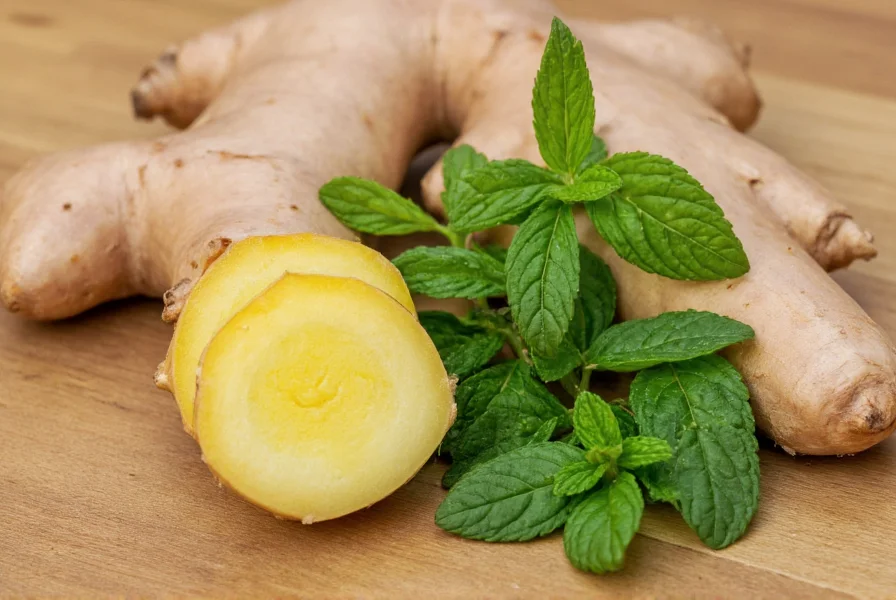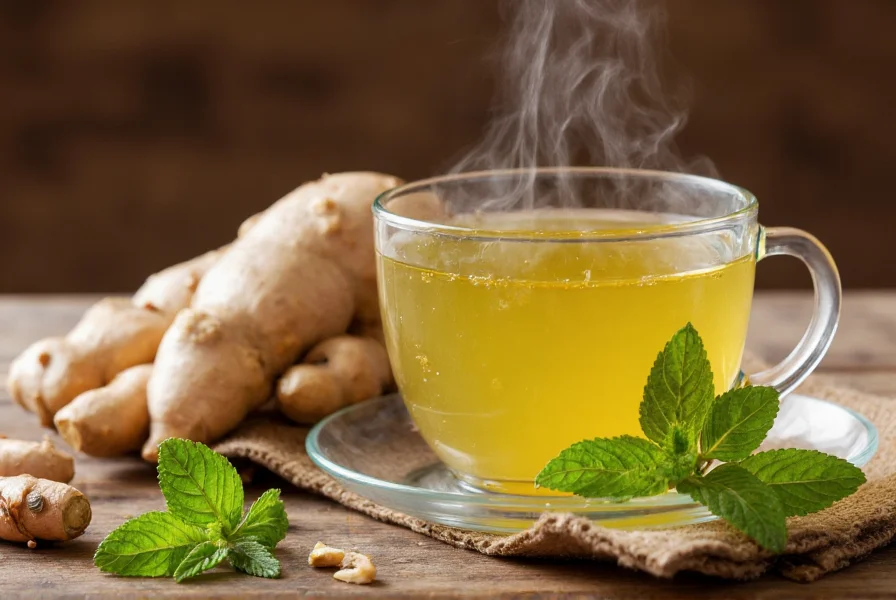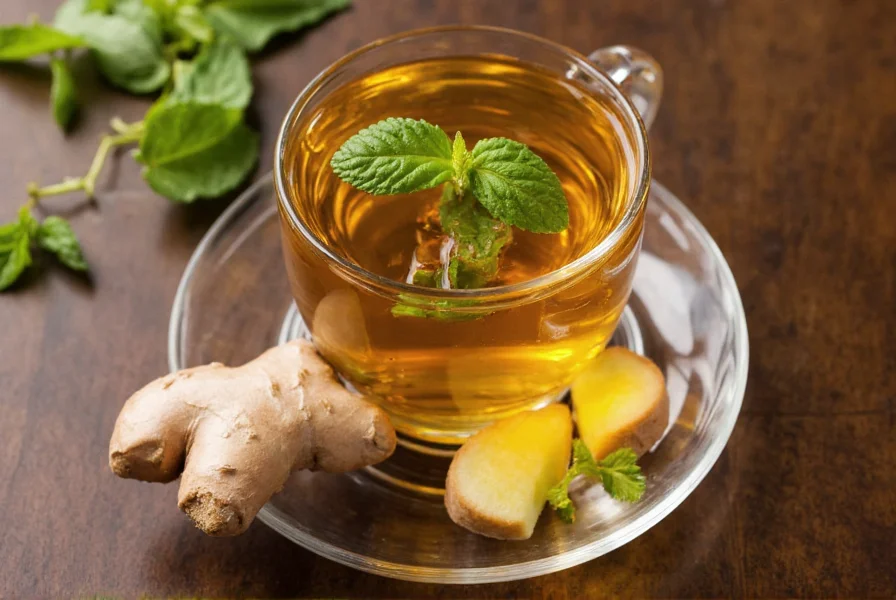For centuries, cultures worldwide have turned to ginger and mint tea as a natural remedy for various ailments. This herbal infusion blends the warming properties of ginger root with the cooling sensation of fresh mint leaves, creating a balanced beverage with multiple health applications. Unlike many commercial teas, this combination doesn't contain caffeine, making it suitable for consumption throughout the day.
Science-Backed Health Benefits of Ginger and Mint Tea
Research indicates several evidence-supported benefits of this herbal combination. A 2020 review published in Nutrients confirmed ginger's effectiveness in reducing nausea and vomiting, particularly for pregnancy-related morning sickness and chemotherapy-induced nausea. The active compound gingerol demonstrates significant anti-inflammatory effects by inhibiting pro-inflammatory cytokines.
Mint, particularly peppermint, contains menthol which relaxes gastrointestinal muscles. A clinical trial in the Journal of Gastroenterology and Hepatology found peppermint oil reduced symptoms of irritable bowel syndrome in 75% of participants. When combined with ginger, these botanicals create a powerful digestive aid that works through multiple physiological pathways.

How Ginger and Mint Tea Supports Digestive Health
The digestive benefits represent the strongest evidence for ginger and mint tea. This combination works through several mechanisms:
- Gastric motility regulation - Ginger stimulates gastric emptying while mint relaxes intestinal spasms
- Nausea reduction - Both ingredients target different receptors involved in nausea pathways
- Gas and bloating relief - Carminative properties help expel intestinal gas
- Acid reflux management - Mint may help relax the lower esophageal sphincter (use with caution if you have GERD)
A 2019 clinical study demonstrated that participants who consumed ginger and mint tea before meals experienced 32% less postprandial bloating compared to the control group. The researchers attributed this to the tea's ability to enhance digestive enzyme production while reducing intestinal inflammation.
Preparing the Perfect Ginger and Mint Tea
Creating an effective ginger and mint tea requires attention to preparation methods. The optimal brewing process preserves the active compounds while extracting maximum flavor:
| Ingredient | Amount | Preparation Method | Brewing Time |
|---|---|---|---|
| Fresh ginger root | 1-inch piece, thinly sliced | Lightly crushed to release oils | 5-7 minutes |
| Fresh mint leaves | 8-10 leaves | Gently bruised before adding | 3-4 minutes |
| Water temperature | 200°F (93°C) | Just below boiling | N/A |
For enhanced benefits when addressing specific concerns:
- For nausea - Add lemon juice which may enhance ginger's antiemetic effects
- For congestion - Increase mint concentration and inhale steam while drinking
- For digestion - Consume 15-20 minutes before meals

Scientific Evidence and Limitations
While numerous studies support individual benefits of ginger and mint, research specifically on their combination remains limited. Most evidence comes from studies examining each herb separately or in broader herbal formulations.
Ginger demonstrates particularly strong evidence for:
- Motion sickness reduction (multiple randomized controlled trials)
- Nausea management during pregnancy (systematic reviews)
- Osteoarthritis pain relief (dose-dependent effects observed)
Mint shows promising results for:
- Irritable bowel syndrome symptom management (multiple clinical trials)
- Tension headache relief when applied topically (limited evidence for oral consumption)
- Respiratory symptom relief through its cooling menthol content
Researchers note that while the combination appears synergistic for digestive issues, more targeted clinical trials are needed to confirm specific benefits of the ginger-mint pairing beyond their individual effects.
Safety Considerations and Potential Interactions
Ginger and mint tea is generally safe for most people when consumed in moderate amounts (1-3 cups daily). However, certain populations should exercise caution:
- People taking blood thinners - Ginger may enhance anticoagulant effects
- Those with gallstones - Ginger may increase bile production
- Individuals with GERD - Mint may relax the lower esophageal sphincter
- Before surgery - Discontinue ginger at least one week prior due to bleeding risk
A 2021 review in Phytotherapy Research noted that ginger consumption exceeding 4 grams daily may cause mild side effects including heartburn, diarrhea, and mouth irritation in sensitive individuals. Mint allergies, while rare, can cause mouth sores or digestive discomfort.
Comparing Ginger Mint Tea to Other Herbal Remedies
When evaluating natural remedies for digestive issues, ginger and mint tea offers unique advantages compared to alternatives:
- vs chamomile tea - More effective for acute nausea but less calming
- vs fennel tea - Better for upper digestive issues, while fennel excels for lower intestinal gas
- vs pure ginger tea - Mint reduces ginger's potential heartburn side effect while enhancing digestive benefits
The combination provides a more balanced effect than single-herb teas, addressing multiple aspects of digestive discomfort simultaneously. Its pleasant flavor profile also makes consistent consumption more sustainable compared to stronger-tasting single-herb remedies.
Frequently Asked Questions
How often can I safely drink ginger and mint tea?
Most adults can safely consume 1-3 cups of ginger and mint tea daily. Those using it for specific therapeutic purposes should not exceed 4 grams of ginger root daily (approximately 2-3 cups of strong tea). Pregnant women should consult their healthcare provider and generally limit to 1 gram of ginger daily.
Can ginger and mint tea help with weight loss?
While ginger and mint tea may support weight management efforts by improving digestion and reducing bloating, there's limited evidence it directly causes weight loss. Some studies suggest ginger may slightly increase thermogenesis, but the effect is modest. The tea's primary value for weight management is as a calorie-free beverage that may reduce cravings when consumed before meals.
When is the best time to drink ginger and mint tea for maximum benefits?
For digestive support, consume 15-20 minutes before meals. For nausea relief, drink at the first sign of symptoms. For respiratory benefits, evening consumption may help with overnight symptom relief. Avoid drinking mint-containing teas too close to bedtime if you experience reflux, as mint can relax the lower esophageal sphincter.
Does ginger and mint tea interact with medications?
Yes, ginger may interact with blood thinners like warfarin by increasing bleeding risk. It may also affect diabetes medications by lowering blood sugar. Mint can interfere with the absorption of certain medications due to its effect on digestive enzymes. Always consult your healthcare provider if you take prescription medications before consuming therapeutic amounts of ginger and mint tea.
Can children safely consume ginger and mint tea?
Children over 2 years can generally consume small amounts (¼ to ½ cup) of weak ginger and mint tea for digestive issues or mild cold symptoms. However, mint should be used cautiously in young children as it may cause allergic reactions in some. For children under 2, consult a pediatrician before use. Never give honey to children under 1 year, even if added to the tea.











 浙公网安备
33010002000092号
浙公网安备
33010002000092号 浙B2-20120091-4
浙B2-20120091-4